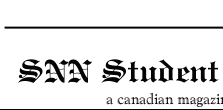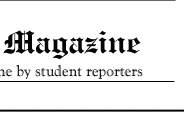 |
 |
|||||
 |
||||||
 |
||||
 |
||||
 |
||||
|
OPINION So you've reached the summit; now welcome to the down part of the rollercoaster ride By Laura S., Grade 12, Delta Secondary, Delta, BC The fabric from fancy dresses dances as their owners twirl. The fresh scent of flowers falls upon multiple noses. The paint from black limousines glistens as the street lamps illuminate the route. The doors open, allowing a sea of formally dressed teenagers to enter the elegantly decorated ballroom. This is the excitement that is ‘Grad'. Soon, this will all be over, and then what? The answer is one little word: Stress. What could possibly bring stress into the picture after such an enjoyable weekend? The answer to this question is also a single word; Provincials. After the celebration of Grad, students attention will turn to those dreaded tests. These tests will have a huge affect on a student's marks (40% of the whole year) and can make, or break a teenager. I have a feeling the stress of Provincials may be starting to hit already, although on a smaller scale, as the big event of Grad takes priority over most things at the moment. What could possibly be the best way to prepare for such immense exams? Unsure of this myself, I turn to an article which was recently printed in The Province, a newspaper published in British Columbia. The article gives a list of twelve strategies you can use to plan and help yourself study effectively. The first suggestion was, "Get organized". Of course, such a suggestion is monotonous. How many times have you been told by your parents or teachers to get organized? I know I have been told that for a long time. No matter how much you want to fight it, this is a good point. Without organization, there is nothing to help you along the way as you study; take a course such as Chemistry – without neat notes, there is no way you'd be able to understand what to do or how to work out a problem. "Write[ing] things down" (number 6 in the article) is also a very important part of studying. Without good written notes, there is nothing to study from. Another good point which was clearly made in the article was, "Listen and pay attention" (number 7). Unlike written notes, which can be copied from a neighbor or a textbook, listening in class is vital. Often, a teacher will try to explain a problem easier then it is explained in a textbook. Teachers are also likely to give clues and shortcuts when it comes to dealing with a difficult question. It also helps if while you are paying attention, you happen to have a pen and paper available; jotting down all that is said is very unlikely, but try to pick and chose what could be useful to know during the exam. A school year can best be summed up as a roller coaster ride. All year, you have climbed the hill, allowing yourself to become accustomed to the tests and assignments given to you by your teachers throughout the year. Once you have reached the summit, all that you can do is hold on, and ride the rest of the year down the hill. Try not to get too nervous or anxious. The truth is Provincials are going to be stressful for everyone as they approach. The best way to deal with the stress will be to be prepared (as the scouting motto goes). I hope this helps you obtain the best mark possible on the horrible exams, and remember, all you can do now is sit tight and finish off the ride.
|